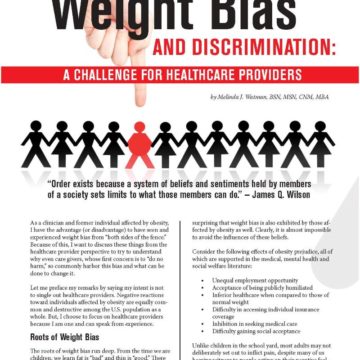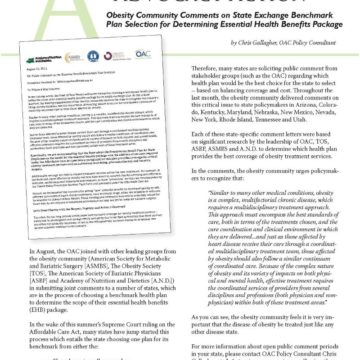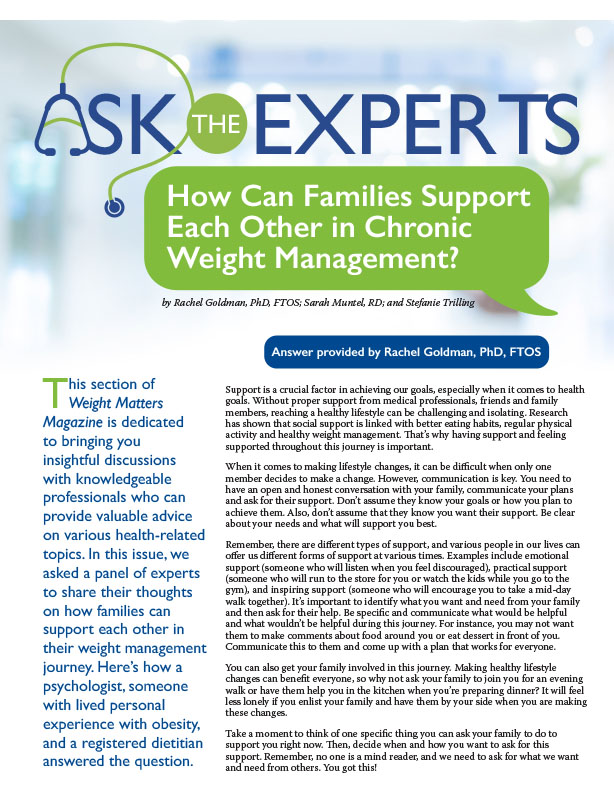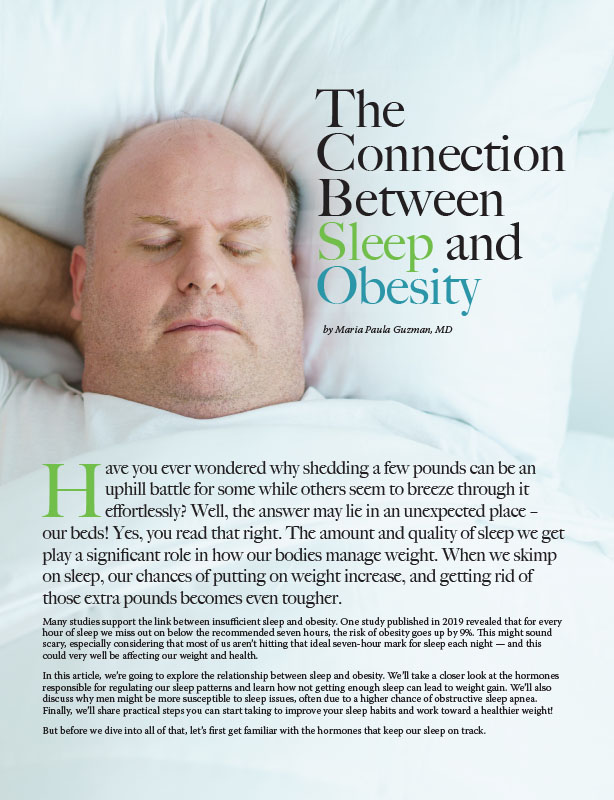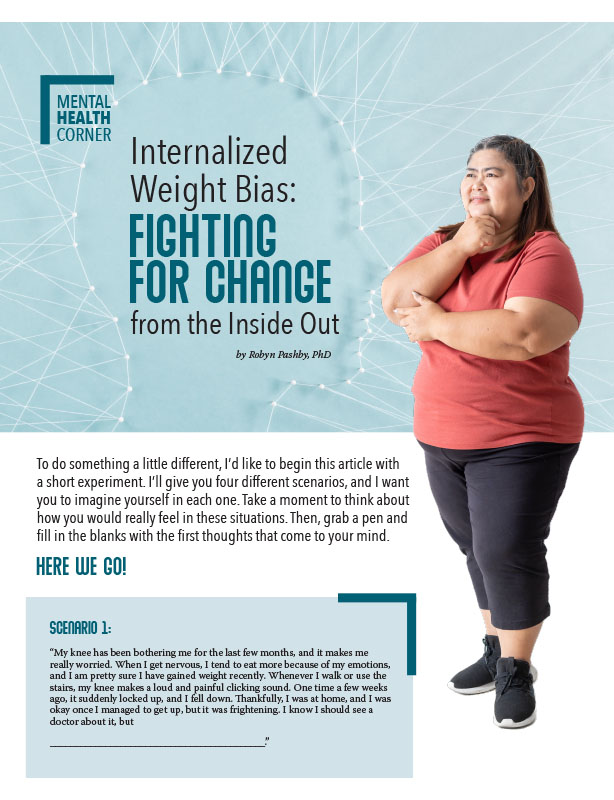Combating Weight Bias and Working with Your Healthcare Provider

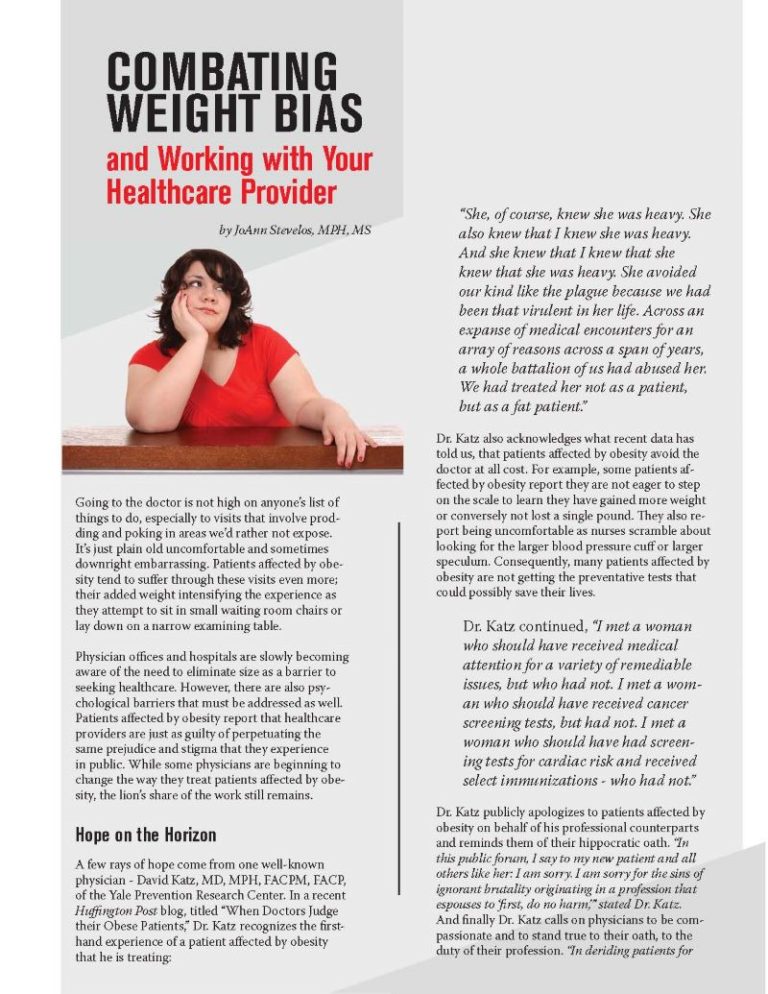
by JoAnn Stevelos, MPH, MS
Fall 2012
Going to the doctor is not high on anyone’s list of things to do, especially to visits that involve prodding and poking in areas we’d rather not expose. It’s just plain old uncomfortable and sometimes downright embarrassing. Patients affected by obesity tend to suffer through these visits even more; their added weight intensifying the experience as they attempt to sit in small waiting room chairs or lay down on a narrow examining table.
Physician offices and hospitals are slowly becoming aware of the need to eliminate size as a barrier to seeking healthcare. However, there are also psychological barriers that must be addressed as well. Patients affected by obesity report that healthcare providers are just as guilty of perpetuating the same prejudice and stigma that they experience in public. While some physicians are beginning to change the way they treat patients affected by obesity, the lion’s share of the work still remains.
Hope on the Horizon
A few rays of hope come from one well-known physician – David Katz, MD, MPH, FACPM, FACP, of the Yale Prevention Research Center. In a recent Huffington Post blog, titled “When Doctors Judge their Obese Patients,” Dr. Katz recognizes the first-hand experience of a patient affected by obesity that he is treating:
“She, of course, knew she was heavy. She also knew that I knew she was heavy. And she knew that I knew that she knew that she was heavy. She avoided our kind like the plague because we had been that virulent in her life. Across an expanse of medical encounters for an array of reasons across a span of years, a whole battalion of us had abused her. We had treated her not as a patient, but as a fat patient.”
Dr. Katz also acknowledges what recent data has told us, that patients affected by obesity avoid the doctor at all cost. For example, some patients affected by obesity report they are not eager to step on the scale to learn they have gained more weight or conversely not lost a single pound. They also report being uncomfortable as nurses scramble about looking for the larger blood pressure cuff or larger speculum. Consequently, many patients affected by obesity are not getting the preventative tests that could possibly save their lives.
Dr. Katz continued, “I met a woman who should have received medical attention for a variety of remediable issues, but who had not. I met a woman who should have received cancer screening tests, but had not. I met a woman who should have had screening tests for cardiac risk and received select immunizations – who had not.”
Dr. Katz publicly apologizes to patients affected by obesity on behalf of his professional counterparts and reminds them of their hippocratic oath. “In this public forum, I say to my new patient and all others like her: I am sorry. I am sorry for the sins of ignorant brutality originating in a profession that espouses to ‘first, do no harm,’” stated Dr. Katz.
And finally Dr. Katz calls on physicians to be compassionate and to stand true to their oath, to the duty of their profession. “In deriding patients for their struggle with weight, we are doing harm. In denying patients the compassion that was the hallmark of our profession long before the cutting edge of biomedical advance was quite so finely honed, we are doing harm. In driving patients away from the very services we are charged to provide them, we are doing harm – and violating our professional oath.”
Conclusion We can only hope that more physicians will heed Dr. Katz’s call for compassion among physicians. But, there is also another important factor to consider, many physicians and nurses are affected by excess weight. Can we include them in our appeal to create a more comfortable and positive experience for patients affected by obesity in their practices?
On a practical level, it makes sense that if nearly 35.7 percent of Americans are affected by obesity, then the majority of patients in any given practice are 35.7 percent of a physician’s income. Therefore, creating a welcoming environment is not only the right thing to do, but can help physicians maintain their practice and makes good business sense.
For more information on weight bias, please visit the “Weight Bias and Stigma,” click here.
About the Author:
JoAnn Stevelos, MPH, MS, is a public health professional and freelance health writer. She has managed all aspects of large health and research programs in the fields of public health, health science research, community development, and youth initiatives. She has a BA from Columbia University in liberal arts, an MS in bioethics from Albany Medical College and an MPH from the State University of New York School of Public Health. Ms. Stevelos’ research is primarily focused on childhood obesity, pediatric ethics and health disparities.
Five Things Healthcare Providers Can Do Right Now to Create a Welcoming Environment for People of All Shapes and Sizes
- Model compassionate behaviors and protocols to foster an environment of acceptance of people of all shapes and sizes.
- Move the scale to a private area and ask patients if they would like to be weighed.
- Stock all examine rooms with instruments of all sizes so they are readily available for nurses and doctors.
- Encourage your staff to visit the “Weight Bias” section of the Yale Rudd Center for Food Policy and Obesity’s Web site for healthcare providers (www.yaleruddcenter.org) and review the materials and videos.
- Be proactive. Access the handouts for patients from the Yale Rudd Weight Bias Web site and distribute them to your patients.
Five Things to Help Make Your Next Physician’s Visit More Comfortable
- Educate and partner with your doctor. Send your doctor Dr. Katz’s article and this article.
- Advocate for yourself and others. When scheduling your appointment, ask if there are accommodations for patients affected by obesity. If not, ask for a referral to another doctor who has accommodations.
- Tell the attending nurse whether or not you would like to be weighed.
- Make a list of your questions or concerns to review with the nurse and doctor.
- Let your doctor know whether you are comfortable talking about your weight.
Talking to Your Doctor about Your Weight
Visiting your doctor can sometimes be difficult or uncomfortable when you are affected by obesity. Discussing your concerns with your doctor can help him or her learn how to make your visits more comfortable and productive. Please answer the following questions, and then give this sheet to your doctor at your next appointment.
How often would you like to be weighed when you visit the doctor?
- At every appointment
- Only when necessary
- Only if I request it
- Once a year
To avoid seeing the number, would you prefer to stand on the scale facing backwards?
- Yes
- Sometimes – if I request it
- No – I would like to see how much I weigh
Would you like your doctor to offer you information and advice about how to lose weight?
- Yes
- Only if I ask for this information
- No
Would you like your provider to ask your permission before discussing your weight with you?
- Yes
- No
How would you like your providers to refer to your weight? Please check all words that you feel comfortable with when talking to your doctor about your weight.
- Body mass index (BMI)
- Obesity
- Body weight
- Weight problem
- Excess weight
- Fatness
- Weight issue
- Extra weight
- Other words you feel comfortable with:____________________________________
by Rachel Goldman, PhD, FTOS; Sarah Muntel, RD; and Stefanie Trilling Winter 2024 This section of Weight…
Read Articleby Maria Paula Guzman, MD Have you ever wondered why shedding a few pounds can be an…
Read Articleby Robyn Pashby, PhD Summer 2023 To do something a little different, I’d like to begin this…
Read Article




